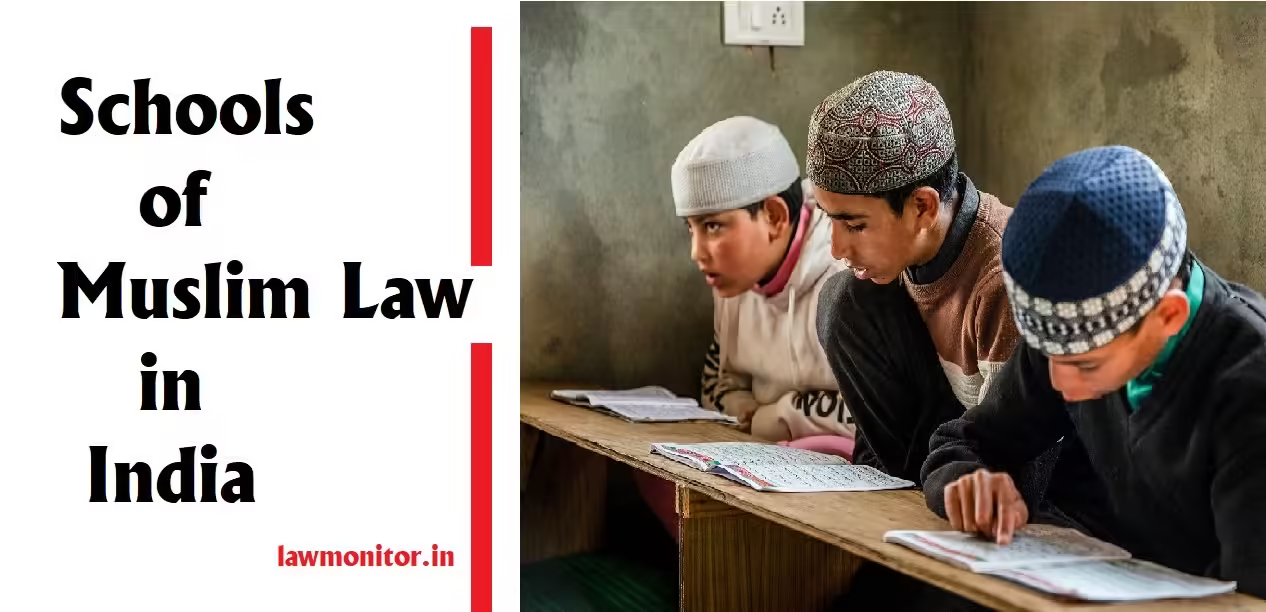Schools of Muslim Law in India- Notes PDF: India has one of the largest Muslim populations in the world, with a long history of practicing Islamic law. In India, Muslim law is mainly based on the teachings of four major schools of thought: Hanafi, Maliki, Shafi’i, and Hanbali. These schools, called Madhabs, offer guidelines for personal and family matters like marriage, divorce, and inheritance.
The Hanafi School of Muslim Law
The Hanafi school is the most widely followed school of Muslim law among Indian Muslims.
- Founded by Imam Abu Hanifa an-Nu‘man in the 8th century.
Known for its flexibility and use of reason and analogy in legal interpretation.Predominantly followed in North India.
- Marriage:
- Recognizes various forms of marriage: Nikah (simple marriage), Muta (temporary marriage), Misyar (traveller’s marriage), etc.
- Emphasizes mutual consent as essential for a valid marriage contract.
- Permits marriage between Muslims and non-Muslims under certain conditions.
- Divorce:
- Recognizes three forms: Talaq (repudiation), Khula (divorce by the wife), Mubara’at (divorce by mutual consent).
- Requires a valid reason for divorce from the husband.
- Encourages reconciliation and dispute resolution before resorting to divorce.
- Inheritance:
- Follows the principle of ‘Aul’ (nearness), prioritizing closest agnatic relatives.
- Recognizes rights of female relatives like daughters, mothers, and wives.
- Criticized for gender bias, giving larger shares to male heirs in some situations.
Criticisms:
- Gender Equality:
- Criticized for gender bias in inheritance laws, seen as discriminatory against female heirs.
- Lack of Uniformity:
- Multiple forms of marriage not recognized by other Muslim law schools lead to confusion and disputes.
- Calls for a standardized approach to marriage laws within Muslim personal law.

The Maliki School of Muslim Law
Named after Imam Malik ibn Anas, a renowned 8th-century jurist from Medina.
Emphasizes local customs and practices, especially those from Medina. Followed by a minority of Muslims in India, mainly in specific regions.
- Marriage:
- Similar principles to the Hanafi school, emphasizing mutual consent, proposal, and acceptance.
- Recognizes Mahr (mandatory payment by the husband to the wife).
- Divorce:
- Recognizes three forms: Talaq, Khula, Mubara’at.
- Requires a valid reason for divorce from the husband.
- Emphasizes reconciliation and dispute settlement before divorce.
- Inheritance:
- Follows the principle of ‘Urf’ (custom), considering local customs in inheritance rights.
- Recognizes rights of female relatives in certain cases.
- Criticized for potential inconsistencies and inequalities due to emphasis on local customs.
Criticisms:
- Rigidity in Interpretation:
- Criticized for strict adherence to practices of Medina, potentially hindering adaptability to modern social contexts.
- May not always align with contemporary principles of justice and equality.
- Limited Application:
- Followed by a minority in India, with limited regional applicability.
- Advocates for greater awareness and acceptance of diverse Muslim law schools to promote inclusivity and diversity in legal practices.
The Shafi’i Muslim Law School
Founding: The Shafii school was founded by Muhammad ibn Idris ash-Shafiʿi.
Emphasizes the Qur’an and the Sunnah (traditions of the Prophet Muhammad) as primary sources of legal guidance. Followed by many Muslims in India, particularly in South India and coastal regions.
- Marriage
- Principles: Mutual consent, proposal, and acceptance are essential elements.
- Mahr (Dower): Recognizes and encourages a formal written contract to avoid future disputes.
- Divorce
- Forms: Recognizes Talaq, Khula, and Mubara’at.
- Process: Requires a valid reason for divorce and emphasizes reconciliation and dispute settlement before proceeding.
- Inheritance
- Principle: Follows the principle of ‘Awl (nearest), where the closest agnatic relatives inherit the property.
- Female Rights: Recognizes the rights of daughters, mothers, and wives in certain cases, with some variations based on local customs and practices.
Criticisms
- Limited Flexibility
- Interpretation: Perceived as rigid due to its strict adherence to the Qur’an and Sunnah, with little room for reinterpretation or adaptation to modern contexts.
- Impact: Critics argue this rigidity may hinder the development of Muslim personal law in India and may not always align with modern principles of justice and equality.
- Regional Variations
- Consistency: Application may vary based on local customs and practices, leading to inconsistencies in legal outcomes.
- Uniformity: Critics call for more uniform interpretation and application to ensure consistency and fairness.
Pros
- Emphasis on the Qur’an and Sunnah
- Traditional Values: Strict adherence to these sources is valued by those who prioritize the preservation of traditional Islamic teachings and practices.
- Recognition of Women’s Rights
- Marriage: Emphasizes mutual consent.
- Divorce: Encourages dispute settlement before divorce.
- Inheritance: Provides inheritance shares to female relatives, supporting gender equality within the framework of Islamic law.
Download PDF Button
Wait Time remaining: 50 seconds
Read Also: Muslim Law: Origin and Sources
Who Found Hanafi School of Muslim Law?
The Hanafi school is the most widely followed school of Muslim law among Indian Muslims. Founded by Imam Abu Hanifa an-Nu‘man in the 8th century.
Who Found The Maliki School of Muslim Law?
Named after Imam Malik ibn Anas, a renowned 8th-century jurist from Medina.
Who Found the Shafi’i Muslim Law School?
Founding: The Shafii school was founded by Muhammad ibn Idris ash-Shafiʿi.
Emphasizes the Qur’an and the Sunnah (traditions of the Prophet Muhammad) as primary sources of legal guidance.


